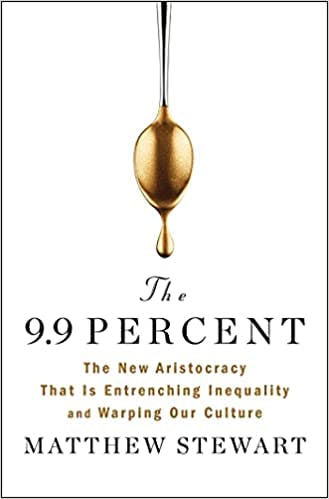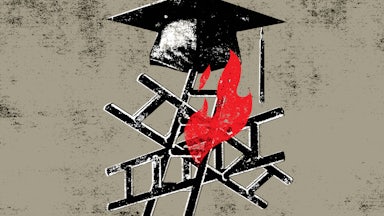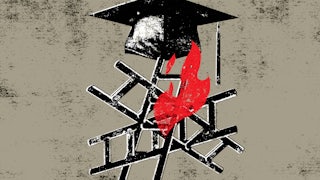Part of the sick genius of the American social consensus is how it instantly naturalizes the logic of economic predation, making a long series of accommodations to money and power seem like immovable fixtures in the natural order of things. This maneuver lies behind many of the signature ills of our age, from the breakdown of basic conceptions of public health and workplace solidarity to the elevation of Donald Trump into the vanguard of an oft-caricatured, incoherent version of American populism. These and scores of other crimes against the public weal are carelessly grouped under this or that vague heading—libertarian prerogative, consumer sovereignty, anti-wokism, what have you—and enshrined as yet another instance of the way things have to be.

Indeed, this reflex has by now become so omnipresent in our public life that it’s hard to see it clearly for what it is: a multifront, rolling foreclosure on the possibility of imagining, yet alone enacting, collective remedies to the savage inequalities of a top-heavy political economy. In The 9.9 Percent, Matthew Stewart studies the people who most enthusiastically embrace these elaborately mythologized relations of economic reward and punishment: the social class just below the new millennial robber barons—the overcompensated, self-regarding, yet terminally anxious cohort of the merely extravagantly privileged. Much more than the monopolistic masters of our economic universe, it’s this group, Stewart argues, that serves to promote rapidly accelerating American inequality as a way of life.
And as Stewart emphasizes, he’s less interested in supplying a collective portrait of these high-octane strivers than building out a record of the havoc they’ve wreaked. “I use ‘the 9.9 percent’ to describe a form of life rather than a set of people identified by their supposed net worth,” he explains at the outset:
It is a way of thinking and a system of values that characterizes many people who are not and have no realistic prospect of joining the top decile of the wealth distribution. Indeed, it matters most precisely insofar as it is shared by those who are not “paid-up” members of the 9.9 percent, as it were. The culture of the 9.9 percent … is a fundamental consequence of rising inequality and it has transformed American life in profound, intimate, and often unacknowledged ways.
Stewart is describing, in short, what Italian Marxist Antonio Gramsci described as the power of cultural hegemony—the means by which a ruling class upholds and defends its rule via cultural practices and beliefs that extend beyond the formal strictures of economic power.
Stewart finds this dynamic at work throughout America’s relentlessly upward-skewing political economy, from the social Darwinian scrum for admission to elite universities to vast disparities in health care provision and housing and racial advantage, to the ongoing assault on reason and evidence-based discourse.
It’s a far-reaching indictment of a conceptually indefensible but institutionally rigid status quo, and it’s to Stewart’s credit that he resists portraying the 9.9 percent as some sort of fallen patrician elite. For the social consensus depends on making the obscene accumulation of privilege appear as an outlying deviation from a basically just and equal mean, which can be remedied more or less on the fly via reformist measures. This circular reasoning produces what Stewart terms “the Iron Law of Merit”—the compulsive worship of individual achievement amid conditions of ever-accelerating social ruin. Or as Stewart elegantly sums up this key article of our social mythology, “the more that merit seems to matter, the less it actually explains.”
This brute logic, Stewart argues, lies behind one of the key paradoxes of our political moment: “why meritocracy—born of the highest ideals of liberal democracy—so often turns into the handmaiden of autocracy.” There’s nothing especially foreordained or apocalyptic about this transformation, he contends; it is, rather, the same process of top-down cultural deference that produced the 9.9 percent as key arbiters of officially sanctioned reward and punishment in the first place: “From the Iron Law of Merit, it follows not just that the wealthy and powerful will be perceived as having merit, but that whatever the people at the top happen to desire will take on the character of merit. Thus, the greater the inequality, the more that merit becomes synonymous with ‘whatever the boss wants.’”
Stewart writes trenchantly about the inner workings of this system because he knows it firsthand: He’s the former founding partner of a global management consulting firm, in the mold of the consulting giant McKinsey and Co. (Indeed, Stewart writes that 80 percent of his fellow partners had matriculated at McKinsey.) In this upside-down economic world, Stewart got a crash course in the hollow character of the meritocratic patter that drives American corporate enterprise. In simultaneously celebrating the triumph of credentialed knowledge and embracing a punishing work ethic, the consulting set has decoupled brain work from any residual notion of productivity. Instead of working smart, hard, or (shudder) collaboratively, the ideal consultant becomes a mindless avatar of work for work’s sake—or perhaps more accurately for the appearance of work’s sake:
The extra hours … are performative. They are not there to get something done, but to prove a point. The obvious part of the point is to manifest the unconditional, strip-me-naked-and-tie-me-to-the-grindstone level of commitment that an employer with access to streams of gusher money may demand in exchange for sharing those market rents with you in particular as opposed to the next fanatical overachiever on the list. It’s the less obvious part of the point—the one intended to convince oneself—that is more concerning. This is the part that involves saying—and believing—that “this Kool-Aid tastes great!”
If this is the state of things at the economy’s commanding heights, the conditions for what Stewart calls the wage-labor-corporate-ownership, or WACO, system are bleaker still. After four decades of concerted assaults on compensation for workers’ productivity gains, coupled with lavish tax giveaways and crackdowns on collective bargaining rights, our labor economy oversees a massive transfer of wealth from the workers who create it to the financial managers atop the corporate order. The 90 percent of the population beneath the 9.9 percent saw labor income as a proportion of overall income shrink from 58 percent in 1979 to less than 47 percent in 2015—all while productivity continued to rise. Meanwhile, corporate profits as a share of gross domestic product doubled from 5 percent in 1970 to 10 percent in 2018. And as Stewart observes, these basic acts of predation go largely unremarked because the point of much mainstream economic thinking is to conceal them. “Economic discourse, at least insofar as it drives politics and policy in America, can’t tell the difference between real people and fictional entities, or between exchanges made in perfect freedom and deals negotiated with your back to the wall and a medical bill pointed at your face.”
The way to reclaim our lethally unequal political economy, Stewart suggests, is to look to the principles of the nation’s democratic founding. Stewart cites Thomas Jefferson’s correspondence with James Madison during Jefferson’s tenure as American ambassador to France, in which Jefferson targets the “unequal division of property” as an abiding source of “misery to much of mankind.” In Jefferson’s battery of proposed reforms—a steep progressive tax on wealth, combined with a steep tax on estates to prevent the accrual of imbalanced wealth across generations—Stewart finds a still-promising starting point. He also endorses Thomas Paine’s proposals to institute a standing 10 percent “ground-rent” tax on all land, in order to fund a universal land-based “inheritance” for all citizens reaching the age of 21, as well as a pension fund for all those over the age of 50.
Stewart takes pains to depict such measures as but a starting point in the battle for a durable and lasting state of socioeconomic equality, since “as a general rule, equality happens on the ground before it happens in the mind.… We can only count on people to pursue equality when the world is, to some degree, equal.” To that end, Stewart counsels a reclamation of the ideals of liberal democracy within the context of our productive lives—particularly by dismantling the obscene prerogatives of private corporations in an aggressive antitrust regime and delivering on the long-deferred promise of deliberative democracy in the workplace: “The best way to ‘redistribute’ the wealth is, as ever, to ensure that people have the power to negotiate their rightful claims to the wealth they produce.”
It’s admittedly an exceptionally tall order in today’s reason-averse and authoritarian-trending plutocracy, but as Stewart makes clear throughout this clear-eyed and incisive study, the template we’ve inherited for discussions of the social democratic harms wrought by the regime of American inequality are exhausted to the point of futility: “The role of the 9.9 percent,” he writes, “is to distribute the blindfolds through which inequality perpetuates itself in a politics of unreason.” If nothing else, The 9.9 Percent is a bracing glimpse of life on the other side of the blindfolds—together with a provisional blueprint for reform once our powers of sight are fully restored.










